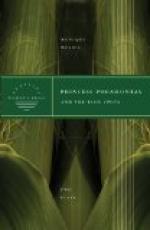The night was a dark one, but now that the moon had risen, long vistas of light shone down the forest avenues, generally at that time so free from underbrush. Nautauquas, looking up through the branches at the moon, thought how it was the squaw of the sun and remembered the queer tales the old women were fond of relating about it.
Suddenly before him he saw a creature dancing down the moon-path, whirling and springing about while a pair of rabbits, that were startled in crossing the path, scurried off into a clump of sassafras bushes nearby. Then, as if reassured, they sat there calmly, even when the dancing figure came closer to them. And Nautauquas heard singing, though the words of the song did not come to his ears. He slipped behind an oak tree and watched the dancer advance. Now that it was nearer he discovered that it was a young girl; her only garment, a skirt of white buckskin, napped against her firm bare brown legs and a necklace of white shells clicked as she spun about. In the branches above some squirrels, awakened from their slumber, straightened their furry tails and began to chatter and a screech-owl tuwitted and tuwhoed. There was something familiar in the outlines, and Nautauquas was therefore not completely astonished when, turning about, she showed the face of Pocahontas.
“Matoaka,” he cried, stepping from the shadow; “what dost thou here alone at night?”
His sister did not scream nor jump at this sudden interruption. She seized her brother’s hand and pressed it gently.
“It was such a beautiful night, Nautauquas,” she replied, “that I could not lie sleeping in the lodge. I come often here.”
“And hast thou no fear, little sister?” he asked affectionately; “no fear of wild animals or of our enemies?”
“Wild animals will not hurt me. I patted a mother bear with cubs one night, and she did not even growl.”
Nautauquas did not doubt her word. He knew that there were certain human beings whom beasts will not hurt.
“And enemies,” she continued, “would not venture so near the village of the mighty Powhatan.”
“I heard thee singing, little White Feather; what was thy song?”
“I made it many moons ago,” she answered, “and I sing it always when I dance here at night. Listen then, thou shalt hear the song Matoaka, daughter of Powhatan, made to sing in the woods by Werowocomoco.”




